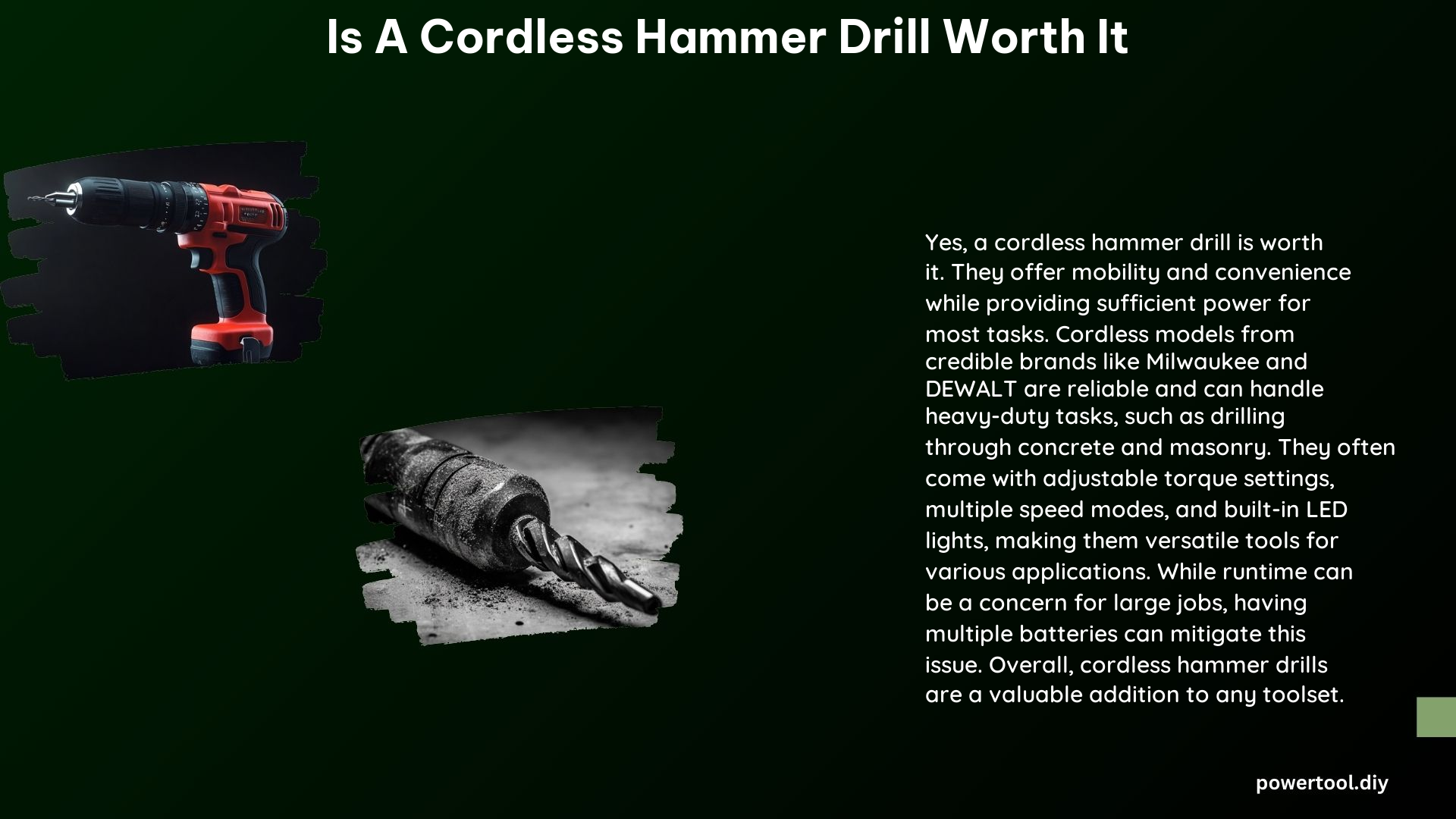Cordless hammer drills have become increasingly popular among DIY enthusiasts and professionals alike, offering a versatile and convenient solution for a wide range of drilling and demolition tasks. However, the decision to invest in a cordless hammer drill can be a complex one, with factors such as power, battery life, and cost to consider. In this comprehensive guide, we’ll delve into the details to help you determine whether a cordless hammer drill is worth the investment for your specific needs.
Is a Cordless Hammer Drill More Powerful Than a Corded One?
Historically, corded hammer drills were considered the more powerful option, with their ability to draw from a constant power source. However, advancements in battery technology have significantly narrowed the gap in recent years. Many modern cordless hammer drills, such as the DEWALT 20V MAX* XR Brushless Hammer Drill, are now capable of delivering comparable power and performance to their corded counterparts.
In fact, some cordless models have even surpassed the power output of their corded equivalents. For example, the MILWAUKEE M18 FUEL 18V Cordless Brushless 1″ SDS-Plus Rotary Hammer Drill boasts an impressive 1.2 joules of impact energy, which is on par with many corded models in the same class.
Comparing Cordless and Corded Hammer Drill Performance

| Specification | Cordless Hammer Drill | Corded Hammer Drill |
|---|---|---|
| Power Output | Up to 1.2 joules of impact energy | Typically 1.5-2.0 joules of impact energy |
| No-Load Speed | 0-1,300 RPM | 0-1,200 RPM |
| Hammer Rate | Up to 38,250 BPM | Up to 4,500 BPM |
| Drilling Capacity | Up to 1″ in concrete | Up to 1.25″ in concrete |
As you can see, while corded hammer drills may still have a slight edge in terms of raw power, the performance gap has narrowed significantly. The convenience and mobility offered by cordless models often outweigh the minor differences in power output.
Benefits of Using a Cordless Hammer Drill Over a Regular Drill
Cordless hammer drills offer several key advantages over regular drills:
-
Mobility: Cordless hammer drills provide greater freedom of movement, allowing you to work in areas where a power cord would be impractical or hazardous, such as on ladders, scaffolding, or in tight spaces.
-
Versatility: Cordless hammer drills often come equipped with multiple modes, including drill-only, hammer drill, and even chisel modes, making them suitable for a wide range of tasks, from drilling holes to light demolition work.
-
Ease of Use: Cordless hammer drills are generally lighter and more ergonomic than their corded counterparts, reducing fatigue during extended use and improving overall user comfort.
-
Shared Battery System: If you already own a cordless drill/driver system, a cordless hammer drill can be a valuable addition, as it can share the same battery packs and chargers, reducing the need for additional equipment.
Is the Extra Cost of a Cordless Hammer Drill Justified for Occasional DIY Projects?
For homeowners and DIY enthusiasts who only occasionally need a hammer drill, the extra cost of a cordless model may not be fully justified. Corded hammer drills can be purchased for a lower upfront cost and are often sufficient for light-duty tasks, such as drilling into masonry for wall anchors or installing shelves.
However, if you anticipate frequent use of a hammer drill, or if you need the added versatility and mobility that a cordless model provides, the investment can be well worth it. Cordless hammer drills shine in situations where a power cord would be inconvenient or where you need to drill in multiple locations without the need to constantly unplug and re-plug the tool.
Additionally, if you already own a cordless drill/driver system, a compatible cordless hammer drill can be a valuable addition to your toolkit, as it can share batteries and chargers, reducing the overall cost of ownership.
Key Technical Specifications to Consider
When choosing a cordless hammer drill, there are several technical specifications to keep in mind:
-
Voltage and Battery Capacity: Look for drills with high-voltage batteries (e.g., 18V or 20V) and high-capacity batteries (e.g., 5Ah or higher) for increased power and runtime.
-
Speed and Torque: Consider drills with adjustable speed settings (e.g., 0-450 RPM, 0-1,300 RPM, 0-2,000 RPM) and high torque ratings (e.g., 38,250 BPM) for versatility and control.
-
Modes and Settings: Opt for drills with multiple modes (e.g., drill-only, hammer drill, drive) and adjustable torque settings to accommodate a wide range of drilling and fastening tasks.
-
Brushless Motor: Cordless hammer drills with brushless motors tend to be more efficient, powerful, and durable compared to their brushed counterparts.
-
Ergonomics: Look for features like soft-grip handles, balanced weight distribution, and trigger-lock mechanisms to reduce user fatigue and improve overall handling.
-
Noise and Vibration: Consider the noise and vibration levels of the hammer drill, as these factors can impact user comfort and safety, especially during extended use.
By carefully evaluating these technical specifications, you can ensure that you select a cordless hammer drill that meets your specific needs and provides the best value for your investment.
Conclusion
In conclusion, a cordless hammer drill can be a valuable addition to your toolkit, especially if you require the extra power and versatility for demanding tasks. While the initial cost may be higher than a corded model, the convenience, mobility, and shared battery system can make it a worthwhile investment for frequent users or those who already have a cordless drill/driver system.
By understanding the technical specifications and weighing the benefits against your specific needs, you can make an informed decision on whether a cordless hammer drill is worth it for your DIY projects or professional work.
